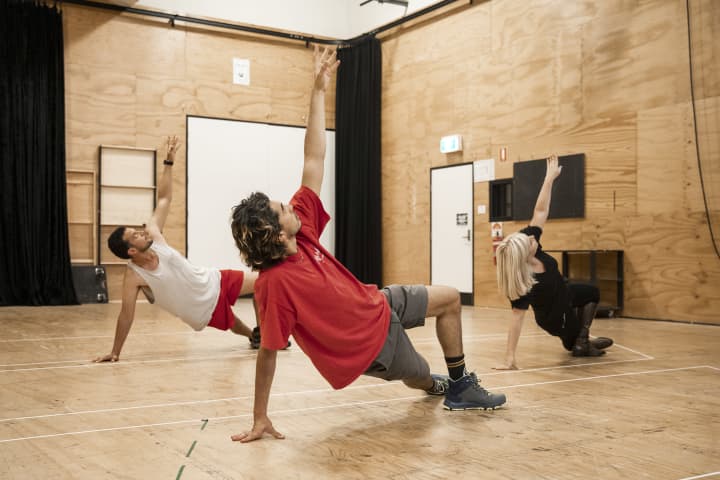‘In the future, theatres – sites of mass gathering where we come together to share in stories, to laugh, cry, heal and connect in the same space – will be more important than ever. We will need stories to reflect and process what we have experienced and cry and laugh together as we figure out how to move forward,’ says MTC Associate Director Petra Kalive.
Petra Kalive joined the MTC team as Associate Director at the beginning of 2020. During this moment of ‘great pause’, we spoke to Petra about how she got her start as a director, saying ‘yes’ more than saying ‘no’, and why theatre is so important to our lives this year and beyond.
When did you know you wanted to be a director?
I had just graduated from the Western Australian Academy of Performing Arts as an actor and was working at St Martin’s Youth Arts Centre in South Yarra earning some money tutoring acting classes, and the then artistic director asked me to assistant direct on a musical. It was a game changer. I loved every moment of it. I didn’t look back after that show.
You are also an actor, writer and dramaturg. How does your experience in these other areas inform your perspective as a director?
All these strands feed into and complement each other. I know what it is to feel vulnerable when performing: we ask our performers to open their hearts, minds and souls for audiences night after night. As a director I never lose sight of what we are asking our actors to do – and because it was my training I use the same actor vocabulary, which can be quite efficient.
‘I do everything in my power in the rehearsal rooms ... to find space for those creative whispers to find their full voice. They are so fragile and so easily squashed or missed.’
I am an accidental writer. I am sometimes compelled to write because there is a story that bubbles up inside me that needs to be told. But more often than not, I support the development of writers far more skilful than myself. Early in my career I had that need to write, and in that case it was an adaptation of an Australian novel. But from that moment on, people considered me a dramaturg and I have been developing new work with writers ever since.
I think understanding and having experienced all these areas makes me very sensitive to the creative whispers of artists. I do everything in my power in the rehearsal rooms and creative processes that I lead to find space for those creative whispers to find their full voice. They are so fragile and so easily squashed or missed.
You were Artistic Director of Union House Theatre at the University of Melbourne from 2015 to 2020. How has working with young theatre makers influenced your own theatre practice?
I feel so grateful to have had the time at Union House Theatre (or UHT). It is the hub at Melbourne University for co-curricular student theatre – that’s right, making theatre outside of coursework because you want to! I oversaw a program of performances led by professional artists, as well as workshops and masterclasses giving students a taste of professional practice. I met the most incredible young artists: insightful, talented, uncompromising, clear and confident. Watch out world, they are on their way and they are brilliant! Intimidatingly so. One of those artists was Jean Tong, who you might remember as the writer of Hungry Ghosts, which I directed for MTC in 2018.
These are the things I learnt in my time at UHT:
- Say ‘yes and’ or ‘yes let’s’ more than you say ‘no’ in a creative context and work just flows.
- More doing less talking.
- Empower everyone in the room to speak.
- Be clear. Be confident. Be calm.
- Does it feel right?
You have several directing credits with MTC, including Hungry Ghosts, Melbourne Talam and Beached. Now you’ve joined the Company as an Associate Director. What are you most looking forward to in this new role?
I am excited to be part of programming discussions, to be working with people at the height of their powers, to be having conversations about the performing arts (why we do it, how we do it and how we can do it better) every day – and of course directing work that is powerful, speaks to the moment and entertains.
You took part in MTC’s Women Directors Program in 2014. What is something that you learned through the Program that still holds true today?
I had the invaluable opportunity to participate in the inaugural year of the Women Directors Program. Since then it has grown into the Women in Theatre Program. I was one of the younger directors of that cohort and meeting those directors whose work I had adored, or having robust conversations about work and developing good relationships were some of the best outcomes for me. I discovered I wasn’t alone and that there were women who I could call upon for feedback on my work, come to a showing, or to talk to about a problem.
It was also a huge benefit to hear how programming happens at MTC, what good female leadership can look like, how we ‘get in our own way’ and how to stop ‘hedging’. The program also gave me the confidence to pursue directing at a time when women were finding it exceedingly difficult to secure mainstage jobs and, importantly, to continue a conversation with Melbourne Theatre Company. I definitely would not be Associate Director now without having participated in that program.
What do you wish someone had told you at the beginning of your career?
Take a moment. Breathe. It’s all going to be ok. It won’t go as planned. Nor as quickly as you want it. And that’s ok.
What is your favourite play and why?
Oh I very much don’t like this question! My favourite play growing up and defining my angsty teenage years was Sophocles’ Antigone. But since then it changes weekly as I read exceptional play after exceptional play. Is that a cop out? Probably.
You recently directed My Brilliant Career, a new musical adaptation of the Miles Franklin novel by Dean Bryant and Mathew Frank. What is your favourite thing about directing new Australian work?
I love the fact there is no set path to follow. Collaborating with your actors, creative team and writer to find a way for the work to live. So much changes in rehearsal for a new work – scripts are edited, first thoughts are thrown out of the window in the translation from page to stage. It is dynamic and precarious, stressful (because no one knows if it is going to work) and there are so many people to bring with you, to inspire you. I love it.
Why is theatre important to our lives in 2020 and beyond?
Being in this moment of ‘great pause’ is demonstrating very clearly that we are social creatures who need to be in the presence of others and in each other’s spaces. We revel and thrive in communal sensory experiences. There is something about the shared experience of performance, feeling the collective energy in a room change because an actor is inhabiting something that can only be experienced live. To witness the virtuosic or spectacle. To have every cell in your body vibrating with the experience of witnessing something very real happen in the moment. It is a different experience to watch something on a screen.
In the future, theatres – sites of mass gathering where we come together to share in stories, to laugh, cry, heal and connect in the same space – will be more important than ever. We will need stories to reflect and process what we have experienced and cry and laugh together as we figure out how to move forward. Theatre is a place where we interrogate what it is to be human, what makes us tick; it imagines and plays out possible futures or alternate realities. It nourishes something very primal in us: the need to physically share in the telling of stories. That’s why it’s important 2020 and beyond.
Published on 22 April 2020





